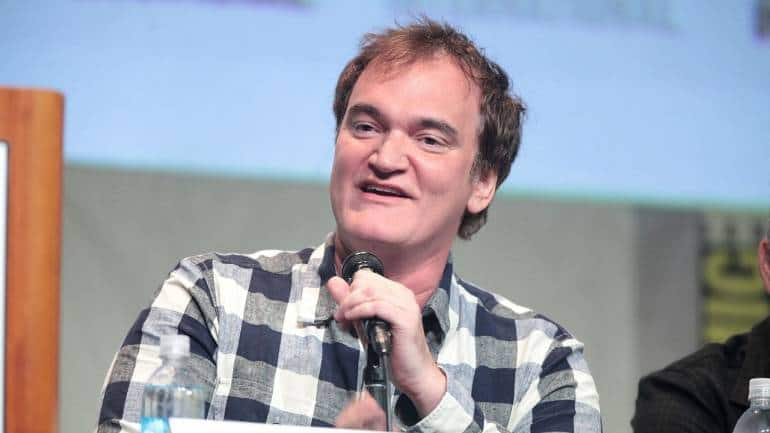



On October 9, 1992, cinemagoers were shocked when Vic Vega (Michael Madsen) slowly and methodically cut off the ear of a bound and gagged cop while dancing to the upbeat sounds of Stealers Wheel’s ‘Stuck in the middle with you’. As the song played on, Vega danced his way out of the room, got a can of gasoline, poured it all over the cop and was about to light him on fire, when he suddenly went down in a hail of bullets. Everyone in the cinema breathed a sigh of relief, while simultaneously marvelling at the filmmaking on display. Little did they know that this first-time filmmaker would change Hollywood for the next three decades and counting.
Quentin Tarantino had arrived.
 Quentin Tarantino (Image via Wikimedia Commons 2.0)
Quentin Tarantino (Image via Wikimedia Commons 2.0)Tarantino’s debut feature-length film, Reservoir Dogs, had premiered at Sundance in January of that year and was the most talked about movie at the festival. Dogs was well-reviewed but not commercially successful. It did, however, give Tarantino the cache to go bigger with his next movie, Pulp Fiction. It was a huge hit, resulting in seven Academy Award nominations including Best Picture, with Tarantino and co-writer Roger Avary taking home the Oscar for Best Original Screenplay. Pulp Fiction is widely recognized as the movie that helped arthouse cinema go mainstream, changing the way movies have been distributed since.
Quentin is a real student of cinema, famously stating "When people ask me if I went to film school, I tell them, 'No, I went to films.'" His influences are wide-ranging, from the late Jean-Luc Godard, whose movie Bande A Part, inspired the name of Quentin’s production label, A Band Apart, to spaghetti westerns, martial arts epics, Hong Kong crime thrillers, and everything in between. He wears his influences on his sleeve, featuring overt homages to his idols while ensuring that his movies still have a distinct point of view and a sensibility that can only be described as Tarantino-esque.
Quentin’s movies have a number of signature elements, including non-linear storytelling, use of retro music, dark humour, hyperviolence, stylized dialogue with creative use of profanity and references to pop culture. More recently, his movies have explicitly placed films and the cinema experience itself at the center of his storytelling. In the climax of 2009’s Inglourious Basterds, Hitler and his High Command are killed at a cinema during the premiere of a Nazi propaganda film. The ammunition used to destroy the cinema is not conventional explosives, but film reels (which are made of highly flammable material). Once Upon a Time in Hollywood centres on a fading actor and his long-time stuntman, who use stunt skills and movie props like a flamethrower to avert the real-life killing of Sharon Tate at the hands of the Manson family. For Tarantino, the real hero is cinema, with the power to right historical wrongs.
In keeping with his love for cinema, Tarantino has used his name and platform to shine a light on foreign filmmakers like Hong Kong’s Wong Kar Wai, and South Korea’s Bong Joon-ho, introducing their talents to a global audience. At the 2020 Oscars, Bong Joon-ho made history with multiple wins for Parasite, beating Tarantino’s Once Upon a Time in Hollywood. When he took the stage for his Best Director win against Tarantino himself, Bong made sure to thank him with a heartfelt ‘I love you, Quentin.’
Tarantino has vowed to retire after making ten movies, and he has one more to go. Meanwhile, he became an author last year with a novelization of Once Upon a Time in Hollywood. His second book, Cinema Speculation, which centres on key films from the 1970s, is out on November 1. He also launched The Video Archives podcast earlier this year with long-time collaborator Roger Avary, where they discuss the VHS movies that influenced them.
Tarantino the filmmaker may retire, but Quentin the student of cinema will never stop.
Thirty years on, Tarantino continues to influence and inspire the next generation of filmmakers. Closer to home, Thiagarajan Kumararaja’s Aaranya Kaandam and Super Deluxe are both worthy tributes to Tarantino. But his influence doesn’t stop at movies, it also extends to television. One need only look at Reservation Dogs, the affecting slice-of-life TV show set on a Native American reservation in Oklahoma. The show’s title is a straightforward homage, but creator Sterlin Harjo takes all the right lessons from Tarantino, building on his influences while making the show and the story uniquely his own. Quentin can now ride off into the sunset like a gunslinger in one of his favourite westerns, secure in the knowledge that he has passed the baton to a new set of storytellers.
 Still from FX's 'Reservation Dogs' (Screen grab)
Still from FX's 'Reservation Dogs' (Screen grab) Discover the latest Business News, Sensex, and Nifty updates. Obtain Personal Finance insights, tax queries, and expert opinions on Moneycontrol or download the Moneycontrol App to stay updated!
Find the best of Al News in one place, specially curated for you every weekend.
Stay on top of the latest tech trends and biggest startup news.